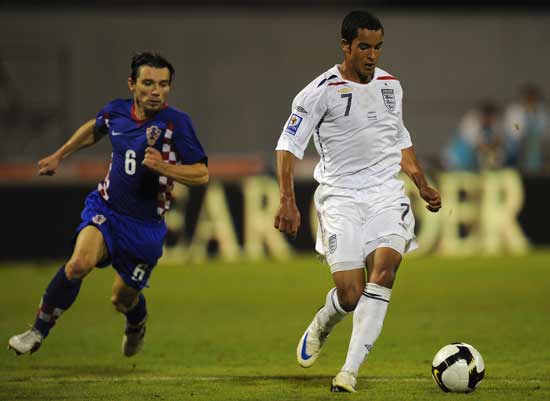Capello shows how to massage the ego and rub magic lamp

Your support helps us to tell the story
From reproductive rights to climate change to Big Tech, The Independent is on the ground when the story is developing. Whether it's investigating the financials of Elon Musk's pro-Trump PAC or producing our latest documentary, 'The A Word', which shines a light on the American women fighting for reproductive rights, we know how important it is to parse out the facts from the messaging.
At such a critical moment in US history, we need reporters on the ground. Your donation allows us to keep sending journalists to speak to both sides of the story.
The Independent is trusted by Americans across the entire political spectrum. And unlike many other quality news outlets, we choose not to lock Americans out of our reporting and analysis with paywalls. We believe quality journalism should be available to everyone, paid for by those who can afford it.
Your support makes all the difference.If the headlines and sports bulletins after England's stunning 4-1 victory in Croatia were understandably dominated by one fresh-faced teenager from Middlesex, there was no shortage of other reasons to believe. To believe, especially, that in Fabio Capello the country may just have a manager with the right balance between carrot and stick, one who can achieve something his predecessors ultimately failed at: bringing the best out of the players at his disposal.
The so-called golden generation, supposed to peak at the 2006 World Cup finals, will remain forever tarnished as underachievers, the blame being split in varying degree between their own shortcomings and those of Sven Goran Eriksson. If Capello, however, can drag performances like Wednesday night's from Frank Lampard, Emile Heskey and Wayne Rooney, as well, of course, as Theo Walcott, then there is hope yet.
He may even have found the best potential attacking partnership in Heskey and Rooney, a combination that, considering they have almost 100 caps between them, has appeared in tandem astonishingly little. Just as Rooney's star was in the ascendancy, from the beginning of 2003, Heskey's was declining. Only twice did they ever start together, on occasions when Michael Owen was injured: playing the first 68 minutes of a largely rearguard action in Turkey in 2003, then for the first half of the following friendly match, a defeat by Denmark at Old Trafford.
From then on, Heskey's increasingly rare appearances tended to be as a substitute for Rooney, and he was ditched after Euro 2004 before being surprisingly recalled three years later by Steve McClaren to terrorise Israel and Russia in 3-0 wins at Wembley.
Owen was his partner, benefiting from the space and flick-ons won for him as he went past the last defender. Playing with Rooney, who now tends to sit deeper, required different qualities, and Heskey showed an ability to hold the ball up quite as well as his rival Peter Crouch, with a more unsettling physical presence than the Portsmouth man.
Lampard might even have found that physical element too much of a good thing after being denied a superbly worked goal – his first in open play for more than a year – by Heskey's push on the brutal defender Josep Simunic.
There were no such problems with Rooney's first goal since the 2-1 defeat in Moscow last autumn – his best performance since that game being crowned with the delicious touch that set up Walcott's second goal. In his second-half performance especially, Rooney offered tantalising hope that he may still become the footballing force of nature that was promised at Euro 2004.
All that will be of little comfort to those strikers left either in the dug-out or by the wayside. Jermain Defoe will remain a prolific finisher in the Premier League, but he missed a glorious chance to prove his international credentials as he was crowded out against Andorra last week.
Heskey replaced him at half-time and was able to confirm himself as a better bet, and a better partner for Rooney. Crouch has been ignored altogether this season despite moving to a club who give him the regular football that Capello has demanded for his prospects.
What the treatment of both has proved is that the manager, unlike Eriksson, is not at all concerned at having to make the hard decisions that his position and salary demand. The next task is finding the best midfield combination once everybody is fit.
What would he have done had Steven Gerrard been available in Zagreb? Stuck him on the right instead of Walcott? Or in the defensive role that he equally dislikes, leaving out Gareth Barry, who proved more than a match for Luka Modric? Dropped Lampard, perhaps, who finally looked a little more like his Chelsea self in an England shirt? And what about when Owen Hargreaves is fit? One or two of them could easily be rested for Kazakhstan's visit to Wembley on 11 October and saved for the marginally more demanding game in Belarus four days later.
But last words must be on Walcott, who at the start of last season revealed in these pages a "very high target" of 25 starts and 10 goals for Arsenal. Aiming high, he fell slightly short: 20 starts, seven goals, his first in the League not coming until his 30th appearance in all, on a day overshadowed at Birmingham by the injury to Eduardo da Silva.
Yet he was making progress, whatever some critics thought, missing only one game all season for the successful England Under-21 side and adding an appearance for the seniors in Trinidad and Tobago.
Time may never be on the side of an England manager, but it is on the side of Theo James Walcott.
Join our commenting forum
Join thought-provoking conversations, follow other Independent readers and see their replies
Comments